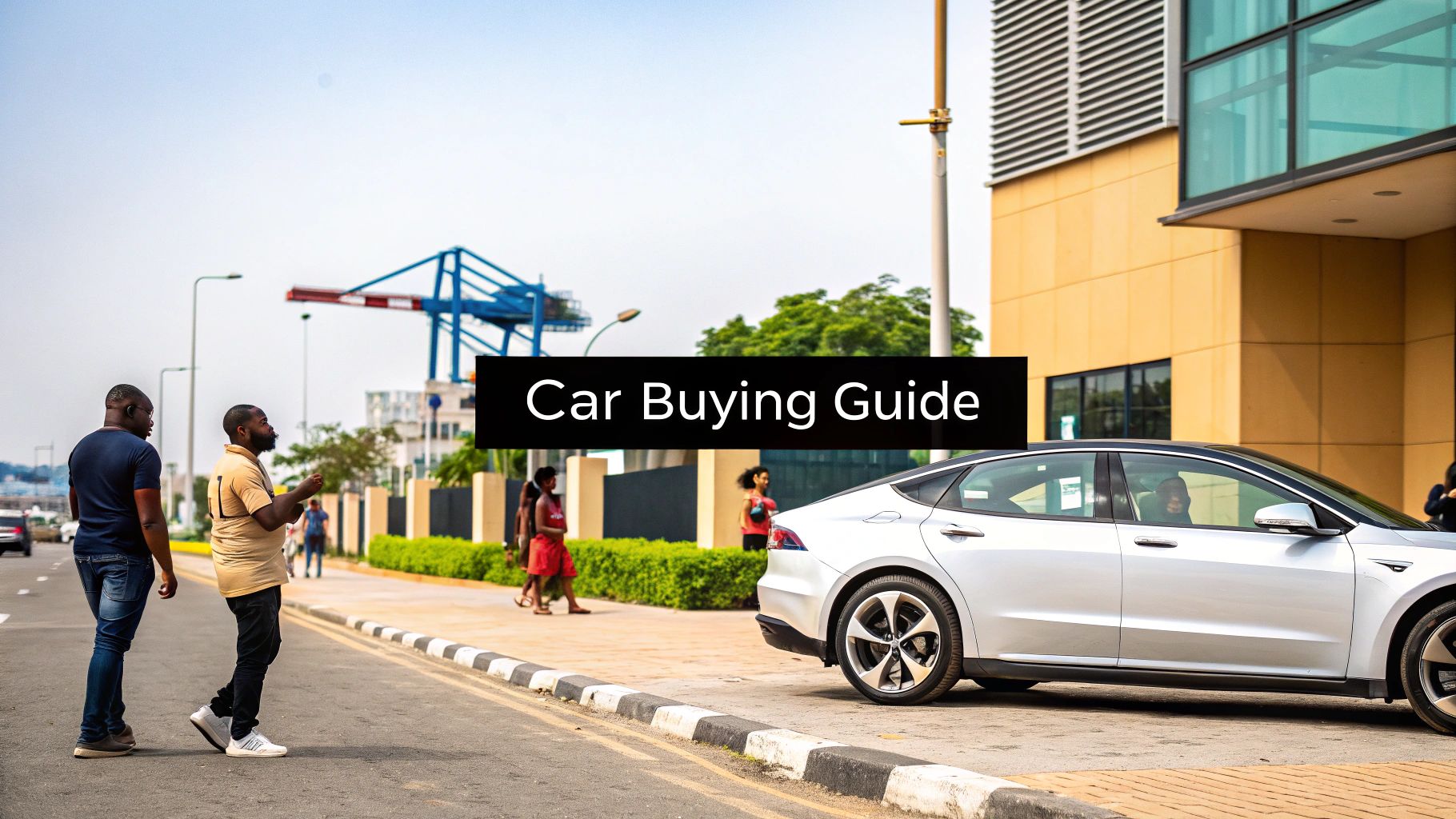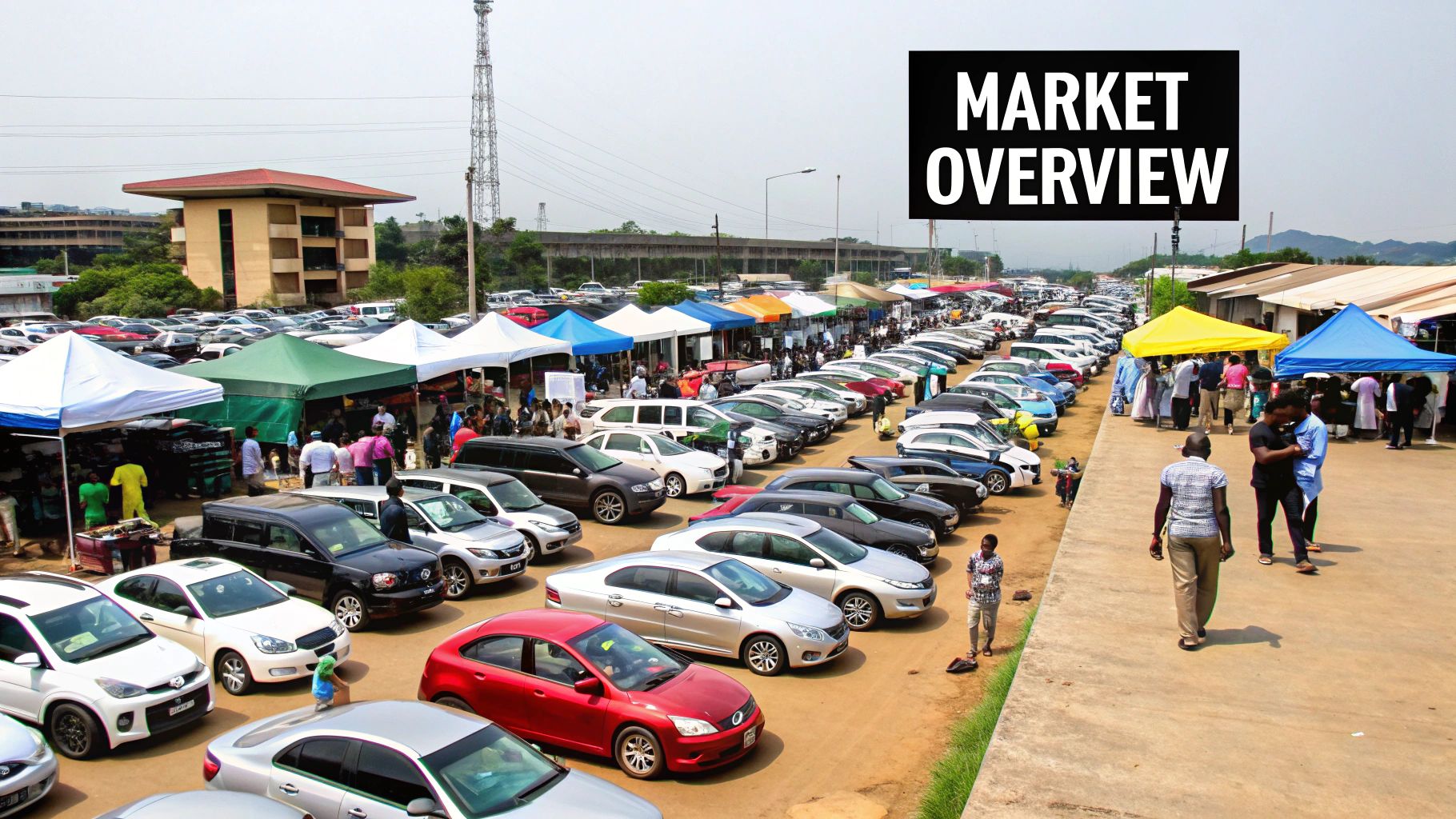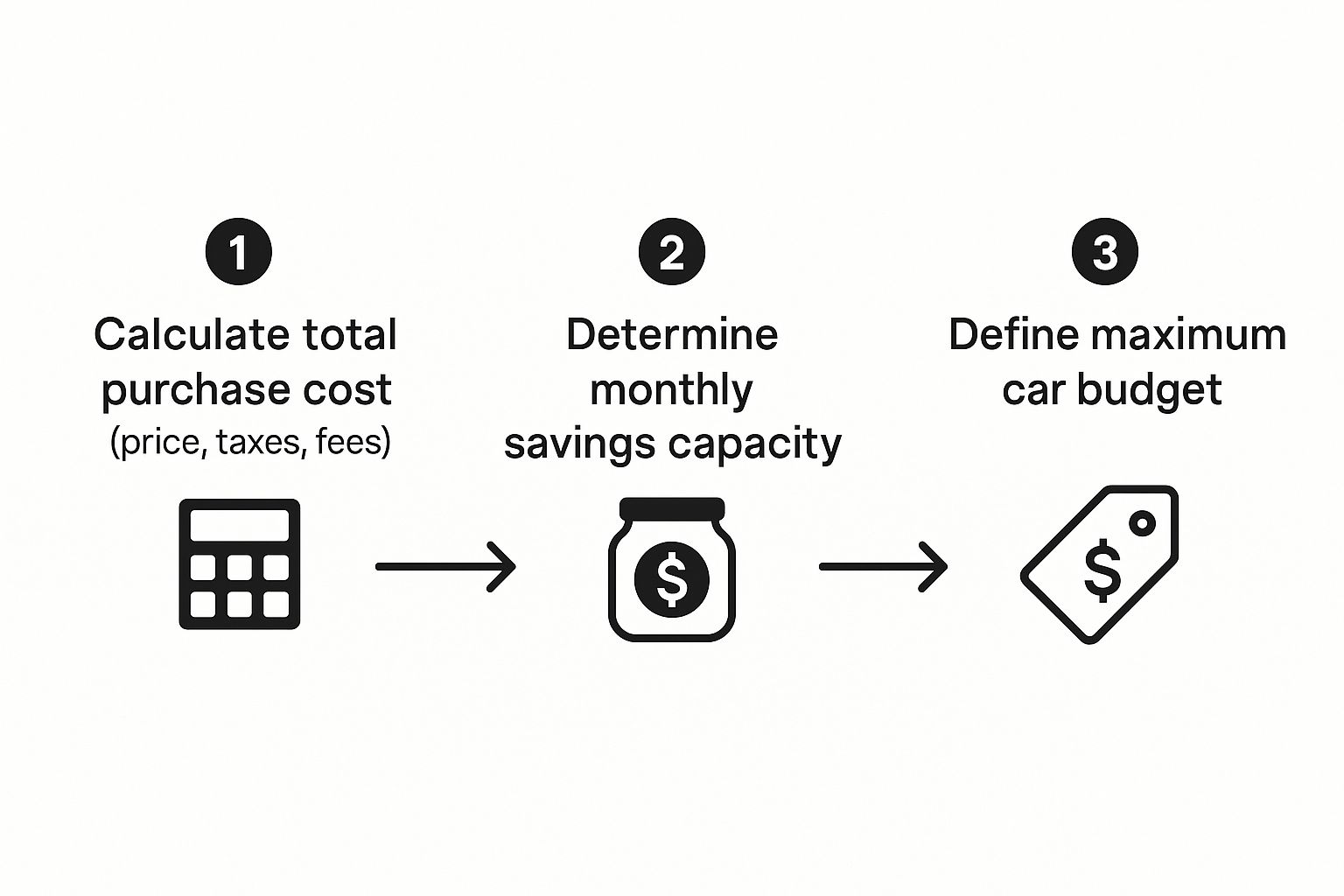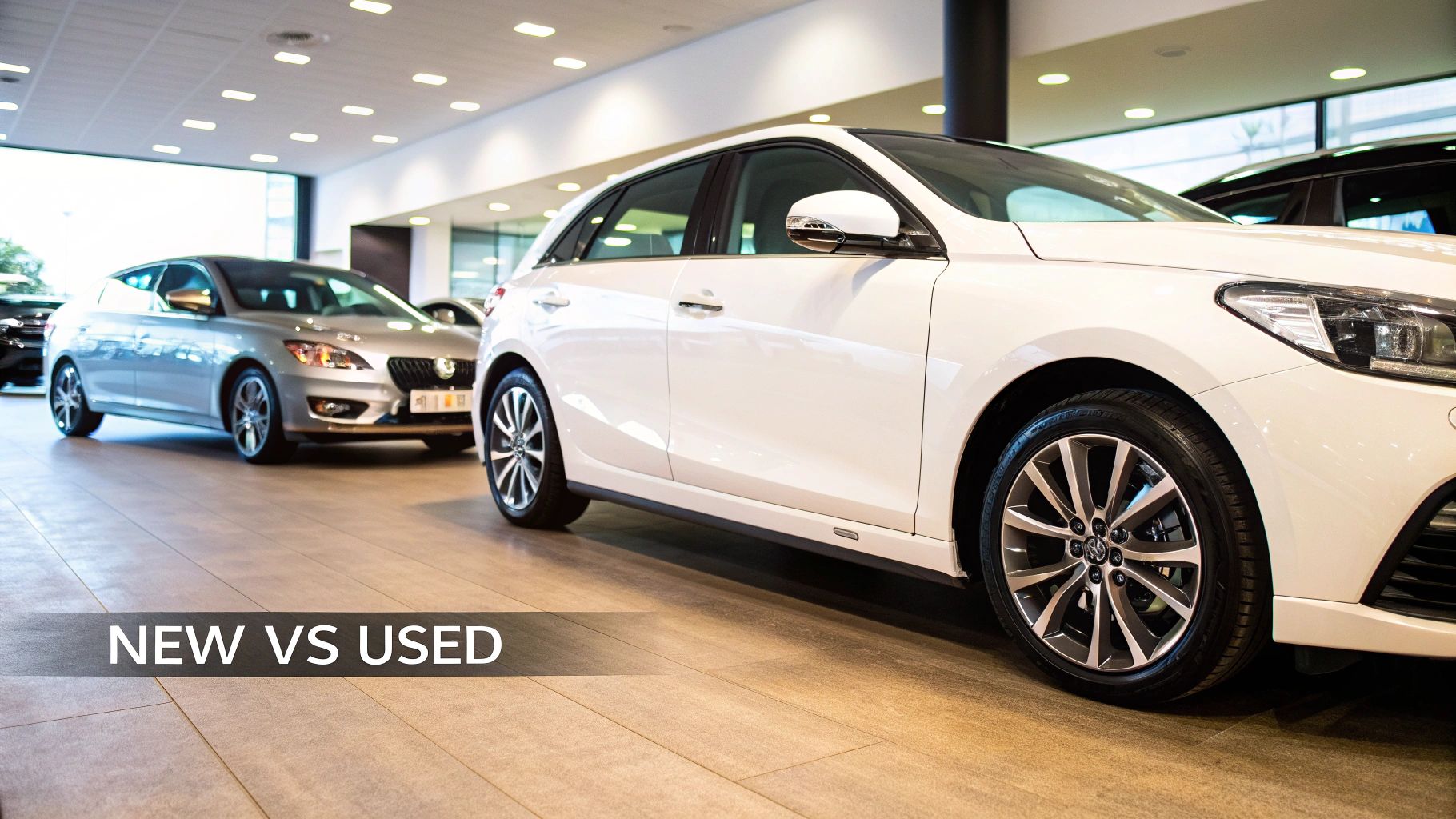
Buying a car in Nigeria can feel like navigating a maze. From locally-used petrol cars to shiny, imported electric vehicles (EVs), the options are vast. But there's a smart path emerging that cuts through the confusion: buying used electric cars for Nigeria, specifically refurbished models from China, through platforms like EV24.africa. This isn't just another option; it's a practical solution that tackles the biggest headaches for Nigerian buyers—high costs and questionable reliability.
How to Navigate the Nigerian Car Market

Stepping into the Nigerian car market can feel like walking into a massive, bustling bazaar. It’s a space dominated by used vehicles, each with its own story and condition. To make a smart choice here, you need more than just a good eye for a car you like; you need a clear-headed strategy right from the start.
Your journey really begins with two simple but crucial questions: what’s your actual budget, and what kind of car genuinely fits your day-to-day life? Answering these honestly will save you from future headaches and guide you toward a vehicle that will serve you well for years.
Understanding Your Core Choices
Before you even think about browsing listings, you need to decide which path you’re going down. The Nigerian market essentially offers a fork in the road, and each route comes with its own set of pros and cons.
Your main options break down like this:
- Locally Used Petrol Cars: These are everywhere and every mechanic knows them. The catch? Their history is often a mystery, and repair bills on older models can pile up fast.
- Imported Used Petrol Cars (Tokunbo): Generally considered a better bet for quality, but they still come with risks tied to their age and whatever wear and tear they endured before landing in Nigeria.
- New Petrol Cars: You get reliability and a warranty, no doubt. But the steep price tag, thanks to high costs and import tariffs, puts them out of reach for most people.
- Refurbished Used Electric Cars (EVs) from China: This is the modern, forward-thinking choice that strikes a great balance between cost and quality. It’s where the market is headed.
Think about it this way: choosing a refurbished EV means you're getting modern tech and dependability for a price that's much closer to that of a used petrol car. It's a way to skip past the usual trade-offs buyers are forced to make.
The Rise of Refurbished Electric Cars
The idea to buy used electric cars for Nigeria, refurbished from China, is a true game-changer. Companies like EV24.africa are opening up this possibility for everyone. "Refurbished" doesn't mean old and patched up. It means a lightly used, recent-model EV has been professionally inspected, serviced, and restored to excellent working condition.
This approach directly solves the market's biggest problems. You dodge the massive cost of a brand-new car while also avoiding the gamble of an ageing, unreliable petrol vehicle. The numbers tell the story: used car imports make up roughly 75% of all vehicle sales in Nigeria, and over 60% of those cars are more than 12 years old. You can learn more about Nigerian automotive market trends to see why fresh alternatives are so desperately needed.
By opting for a refurbished EV, you're not just buying a car; you're investing in newer, more sustainable technology right from the get-go.
A Step-by-Step Car Buying Process
Jumping into the car market in Nigeria can be a thrilling experience, but you don't want to go in blind. Think of this guide as your personal roadmap, designed to help you navigate every turn, from that first thought of "I need a new car" to shaking hands on the final deal. It doesn't matter if you're looking at a local dealership or planning to buy used electric cars for Nigeria from overseas—having a solid plan is your best insurance against expensive headaches.
We can break the whole journey down into a few clear stages. First, we'll lay the groundwork by figuring out a sensible budget and doing some smart research. Then, we get to the hands-on part: checking the car over and making sure the paperwork is legit. Finally, we'll talk about how to negotiate like a pro, so you can drive away knowing you got a fair price.
Setting a Realistic Budget
Before you even start scrolling through car listings, the very first thing to do is take a hard look at your finances. A classic mistake is getting fixated on the price tag alone. The reality is, the sticker price is just the beginning; the real cost of getting a car on the road is much higher.
To avoid nasty surprises down the line, you need to factor in all the extra costs from the get-go. This includes things like import duties if the car is coming from overseas, local clearing fees, vehicle registration, and your first year of insurance. When you add all these up, you get the Total Cost of Acquisition—a far more accurate number than just the seller's asking price.

As you can see, a smart budget comes from understanding both the total upfront cost and what you can comfortably afford to spend.
Conducting Thorough Research and Inspection
Once you have a firm budget, the fun part begins: the search. Your goal is to find cars that not only fit your budget but are also known for being reliable. Models like the Toyota Camry, for instance, are popular for a reason—they are built to last, and finding spare parts in Nigeria is never a problem.
After you've shortlisted a few options, it's time for the inspection. Honestly, this is the most important step of all. Never, ever just take the seller's word for it. You have to see for yourself or, even better, get a professional to look it over.
A proper inspection has two sides to it:
- Mechanical Health Check: This is where you or your mechanic pop the bonnet and check the engine for leaks or weird sounds. You'll also want to look at the tyre condition, test the brakes, and make sure all the lights and electronics are working as they should. Spending a little to hire a good mechanic for an hour can easily save you a fortune in future repairs.
- Document Verification: The paperwork is every bit as critical as the engine. You need to carefully check that the Vehicle Identification Number (VIN) on the car's body matches what's on the customs papers and proof of ownership documents.
A mismatched VIN is a massive red flag. It could mean the car is stolen or the paperwork is fake. Getting this one detail right can save you from a world of legal and financial trouble.
To make sure you don’t miss anything, using a detailed car inspection checklist is a brilliant way to stay organised and check all the important boxes.
Mastering Negotiation and Finalising the Deal
So, the car checks out and the documents are all in order. Great! Now, it's time to talk price.
Everything you learned during your research and inspection is your ammunition here. If your mechanic pointed out a few minor issues that need fixing, you can use the estimated cost of those repairs to negotiate the price down.
Remember, the asking price is almost always just a starting point. Based on your budget and the car's actual condition, make a reasonable offer. Be confident and polite, but also be ready to walk away if the seller won't agree on a fair price.
Once you’ve settled on a number, get everything in writing and make sure all the ownership documents are officially and properly transferred to your name.
Calculating the True Cost of Car Ownership

That price tag on the car's windscreen? Think of it as just the down payment on the full story. The actual cost of buying cars in Nigeria goes way beyond that initial number. The true cost of ownership is a mix of one-time fees you'll pay right away and the running expenses that will follow you for years.
To make a smart choice, you have to look at the whole picture. This means budgeting for every single naira you'll spend, from the moment the car arrives at the port to the everyday costs of keeping it on the road. Getting a handle on these often-overlooked expenses is the secret to avoiding a financial headache down the line.
Uncovering the Upfront Costs
Before you can even jingle the keys in your hand, there’s a list of payments you have to clear to get your car on the road legally. First-time buyers often miss these, but they represent a hefty chunk of your initial investment.
These costs almost always include:
- Import Duties: This is a big one. It's a government tax on imported vehicles and can be a massive percentage of the car's value.
- Clearing Fees: You’ll need to pay agents and port authorities to get your car through customs and officially released to you.
- Vehicle Registration: This is the official process with the Federal Road Safety Corps (FRSC) to get your documents and number plates.
- Initial Insurance Premium: You can’t legally drive without at least third-party insurance, and the first year's payment is due immediately.
Don't be surprised if these fees add 25% or more to the car's purchase price, especially for imported vehicles. Forgetting to factor them in can quickly turn your exciting new purchase into a major source of stress.
The Long-Term Financial Commitment
Once you’ve settled all the upfront bills, your focus shifts to the ongoing running costs. This is where the real difference between a traditional petrol car and a modern Electric Vehicle (EV) starts to become glaringly obvious.
Think of a petrol car's running costs like a subscription with lots of small, constant charges. You're buying fuel every week, servicing the engine every few months, and regularly replacing parts like spark plugs and oil filters. Each of those small payments snowballs into a huge annual expense.
As you plan, it's also smart to understand the differences between commercial and personal auto insurance. Choosing the right policy isn't just about being legal; it's about protecting your investment and accurately forecasting your long-term expenses.
Petrol vs Electric A Head-to-Head Cost Comparison
An EV, on the other hand, plays by a different set of financial rules. While the initial purchase price might be in the same ballpark as a good petrol car, the long-term savings are where it pulls ahead. By cutting out petrol entirely and sidestepping most traditional maintenance, an EV can seriously slash your monthly budget.
Let’s put some numbers to it and see how these costs stack up over an average year.
The table below gives a clearer picture of what you can expect to spend annually on both types of vehicles in Nigeria.
Cost of Ownership Petrol Car vs Electric Vehicle (EV) in Nigeria
| Cost Factor | Petrol Car (Estimated Annual Cost) | Electric Vehicle (EV) (Estimated Annual Cost) | Notes |
|---|---|---|---|
| Fuel / Energy | ₦1,200,000+ | ₦250,000 | Based on average mileage. Home charging an EV is dramatically cheaper than buying petrol. |
| Routine Maintenance | ₦150,000 | ₦30,000 | Includes frequent oil changes, filter replacements, and spark plugs for petrol cars. EVs only need basic checks. |
| Major Servicing | ₦100,000 | ₦20,000 | Accounts for potential engine, exhaust, or transmission work on a petrol car. EVs have far fewer moving parts. |
| Insurance | ₦120,000 | ₦120,000 | Comprehensive insurance costs are generally similar for vehicles of a comparable value. |
| Annual Total | ₦1,570,000 | ₦420,000 | The estimated annual savings with an EV can be well over ₦1,000,000. |
This side-by-side comparison makes it clear: the sticker price is just one piece of the puzzle. The incredible long-term savings an EV offers can make it the more financially savvy choice after just a few years, giving your wallet some much-needed breathing room.
Buying Used Electric Cars for Nigeria, Refurbished from China
Feeling caught between the steep price of a brand-new car and the risk of a used, unreliable petrol model? It’s a common headache for anyone trying to navigate the process of buying cars in Nigeria. But there’s a smarter path emerging—one that completely sidesteps these old problems.
The answer is to buy used electric cars for Nigeria, specifically refurbished models imported directly from China, with a trusted service like EV24.africa handling all the heavy lifting. This route puts advanced, reliable, and high-performing vehicles within your reach, all for a fraction of what a new car would cost.
So, What Exactly Is a 'Refurbished EV'?
The word "refurbished" can throw people off, so let's get clear on what it means. We’re not talking about old, worn-out cars that have been quickly patched up. A refurbished EV is a gently used, recent-model electric car that has gone through a rigorous, professional process before it's even listed for sale.
Think of it this way: a large company in China might decide to upgrade its entire fleet of two-year-old electric cars. These vehicles are in fantastic shape but are now surplus to requirements. That’s where a service like EV24.africa comes in, acquiring these prime vehicles.
From there, every single car undergoes a meticulous process:
- A Full-System Inspection: Technicians pore over everything—from the battery’s health and the electric motor down to the brakes, suspension, and interior tech. Nothing is overlooked.
- Professional Servicing: Any part showing even minor wear is serviced or replaced to meet strict quality standards. This guarantees the car runs just like it should.
- Detailed Valeting: The car is professionally cleaned inside and out, restoring its look and feel to a near-new condition.
The final product is a modern electric car with low mileage and years of excellent service ahead of it, but at a far more accessible price. You get all the perks of recent technology without suffering the massive depreciation that hits brand-new car owners.
The Powerful Benefits of Choosing This Route
Going for a refurbished EV from China isn’t just about saving a bit of cash upfront. It’s about a smarter, more sustainable, and genuinely more enjoyable ownership experience that directly tackles the challenges we face in Nigeria.
The biggest win is the dramatic drop in running costs. As we've seen, fuelling and maintaining a typical petrol car can easily cost you over ₦1,500,000 a year. With an EV, you charge at home and have almost no maintenance to worry about, slashing those costs by over 70%. That’s real money back in your pocket, month after month.
But it’s not just about the savings. You're stepping into a different class of vehicle altogether. Suddenly, you can afford a recent model with features like advanced driver-assistance systems, huge touchscreens, and that silent, instant acceleration—things usually found only in high-end luxury cars.
On top of that, you’re making a real difference to the environment. With zero tailpipe emissions, you're helping to create cleaner air in our cities, which benefits everyone. It’s a responsible choice for our collective future.
How EV24.africa Makes the Whole Process Simple
The thought of importing a car can be daunting. The paperwork, the shipping logistics, the customs clearance—it’s a maze that can cause major headaches. This is exactly where EV24.africa steps in to turn a complicated task into a smooth, managed process for anyone looking to buy used electric cars for Nigeria.
They've designed their system for total peace of mind:
- Browse a Hand-Picked Inventory: You start by looking through a selection of high-quality, pre-inspected refurbished EVs on their platform. Every car has detailed info and crystal-clear pricing.
- Get Expert Guidance: Their team is on hand to help you pick the right car for your needs and budget. They'll answer all your questions about range, charging, and features.
- They Handle the Logistics: Once you’ve picked your car, EV24.africa takes over completely. This includes secure payment, professional shipping from China to Nigeria, and all the required documents.
- Customs Clearance is Sorted: They deal with the complexities of Nigerian customs on your behalf, making sure all duties are paid and the paperwork is perfect. For a deeper dive into what’s needed, check out our guide on Nigeria's EV import rules for 2025.
- Final Delivery to Your Doorstep: Your car is cleared, registered, and delivered to you, completely ready to drive.
By managing every single step, EV24.africa takes all the guesswork and risk out of importing. It makes the journey of buying cars in Nigeria a secure and predictable one, opening the door for you to enjoy all the benefits of going electric without any of the old barriers.
Getting the Paperwork Right: Your Guide to Car Purchase Regulations

When it comes to buying cars in Nigeria, think of the paperwork as more than just a formality—it’s your legal shield. Getting the documents right, and making sure they're all verified and authentic, is the single most important part of securing your ownership. It's the difference between a smooth ride and a future full of legal headaches.
The documents you'll need depend on whether you're buying a car that's already here ("tokunbo" or locally used) or importing one directly. Each piece of paper tells part of the car's story, and learning to read that story is a skill every smart buyer needs.
Essential Documents for Locally Purchased Cars
If you're buying a car already in Nigeria, your goal is simple: confirm the seller actually has the legal right to sell it to you. The paperwork trail should be clean and consistent.
You absolutely must insist on seeing and verifying these key documents:
- Proof of Ownership: The non-negotiable document showing the current owner’s name.
- Customs Papers: Even if it’s been used locally for years, if it was originally imported, you need to see the original customs duty payment documents.
- Police Report: A recent police report is good assurance that the vehicle isn't on a stolen list.
- Vehicle Licence: Check that it's current and that all the details match the car perfectly.
Don't ever accept photocopies or flimsy excuses. A missing document is a massive red flag. It could mean the vehicle was stolen or that the owner is trying to avoid paying the proper duties.
Navigating Import and Customs Paperwork
When you buy used electric cars for Nigeria from China, it adds another layer of complexity. The import papers are your proof that the vehicle entered Nigeria legally and that all the necessary taxes and duties were paid.
Think of customs documents as your car's passport. Without the right stamps and approvals, it can't legally exist or operate in Nigeria. Trying to sidestep this process is a recipe for disaster and could lead to your vehicle being seized.
The key import documents you'll encounter are:
- Bill of Lading (B/L): This is your receipt from the shipping company, tracking the car's journey from its original port to Nigeria.
- Pre-Arrival Assessment Report (PAAR): The Nigeria Customs Service generates this report, which calculates the exact duty you need to pay.
- Form M: This is a mandatory document for all imports into Nigeria, and it has to be started through an authorised dealer bank.
The Nigerian government is also pushing for more local assembly and investment in electric vehicles as part of its economic strategy. Looking ahead, from 2025 to 2029, the Nigerian auto market is expected to grow steadily, thanks to a rising middle class and more people in cities needing personal cars.
The EV24.africa Advantage in Documentation
Let's be honest—this is where the process can get really overwhelming. Nigeria's customs clearance system is notoriously complex, and one small mistake can lead to massive delays and fines. This is exactly the kind of headache a service like EV24.africa was created to eliminate.
When you buy a refurbished EV from China through them, they take on the entire documentation and customs nightmare for you. Their team knows the system inside and out, ensuring every paper is filed correctly and every duty is paid properly. This turns a huge obstacle into a simple, seamless part of the process.
They handle the complexity so you can focus on the excitement of getting your new EV. Of course, the financial side is just as important, and you can learn more by checking out our guide on government incentives for EV buyers in Africa. It all works together to make the journey to EV ownership secure and transparent.
Common Car Buying Mistakes to Avoid
Look, the smartest people in any room are the ones who learn from other people's blunders. Buying a car in Nigeria can be a fantastic experience, but it’s also a minefield of potential traps that can turn your dream ride into a real money pit. Think of this section as your pre-flight checklist—everything you need to know to avoid a costly crash landing.
The first and most common trap? A deal that looks way too good to be true. Let’s be real, if a car is priced far below everything else on the market, there's a reason. It's almost always a massive red flag, pointing to serious mechanical faults, a dodgy past, or paperwork so bad your vehicle could get impounded.
Another classic mistake is skipping the pre-purchase inspection. A car can look shiny and perfect on the outside, and the seller might have the smoothest sales pitch you’ve ever heard. But only a good mechanic can tell you what’s really going on under the bonnet. Spending a little on an inspection now can literally save you hundreds of thousands of naira later.
Ignoring the Vehicle's History and Paperwork
This one is a deal-breaker. Failing to dig into a car's history and its documents is a gamble you just can't afford to take. Every car has a story, and its paperwork tells it all. You have to be meticulous here.
Check that the Vehicle Identification Number (VIN) on the car itself matches what's on the customs papers, proof of ownership, and vehicle licence. If those numbers don't line up perfectly, walk away. It could mean the car is stolen or the documents are fake. In the same vein, incomplete customs paperwork will create a world of legal and financial headaches for you down the line. Don’t just glance at these papers; scrutinise them.
Overlooking the Total Cost of Ownership
It’s easy to get fixated on the sticker price, but that’s a rookie mistake that can lead to major financial stress. As we've already touched on, the real cost of owning a car is so much more than what you pay the seller. You've got import duties, clearing fees, registration, and then the never-ending costs of fuel, maintenance, and insurance. If you haven't budgeted for all of this, you haven't budgeted properly.
This is especially true right now. In early 2025, the Nigerian vehicle market saw sales drop by 18.4%, and even the EV segment pulled back by 7.3% because of infrastructure issues. This kind of volatility means you have to be even smarter about the long-term commitment. You can explore more on the Nigerian vehicle market's performance to understand why seeing the bigger financial picture is non-negotiable.
A car purchase is not a one-time transaction; it's a long-term financial relationship. Understanding and planning for every associated cost is the difference between a joyful ownership experience and a constant source of anxiety.
By keeping these common pitfalls in mind, you can navigate the process with confidence. Resist the urge to jump on a deal that seems unbelievably cheap, always get an expert opinion, pore over every document, and calculate the true cost. Do these things, and you'll be on your way to making a smart, secure, and satisfying purchase.
Your Top Questions About Buying a Car Answered
Let's face it, buying a car in Nigeria can feel like navigating a maze. You've got questions, and that's completely normal. To help clear things up, we've tackled some of the most common queries that pop up, from how to pay for your new ride to what it's really like to own an EV right now.
What Are the Best Financing Options for a Car in Nigeria?
Finding affordable financing can be one of the biggest hurdles, as traditional bank loans often come with steep interest rates. The most popular route is a personal loan from a commercial bank, but you'll need a solid credit history and proof of a steady income.
Don't overlook other avenues! Microfinance banks and cooperative societies are fantastic alternatives. Cooperatives, in particular, are known for offering their members loans with much friendlier terms. If you decide to buy used electric cars for Nigeria with EV24.africa, it's always a good idea to ask if they offer payment plans or have partnerships with lenders—this can make the upfront cost a lot more manageable.
How Long Does It Take to Import a Car?
Patience is key here, because importing a car isn't an overnight process. Shipping a vehicle from a country like China to a Nigerian port in Lagos typically takes anywhere from 30 to 60 days. But the clock doesn't stop once the ship docks.
Next up is customs clearance. This stage can easily add another one to three weeks to your timeline. How smoothly this goes really depends on your clearing agent's efficiency and how spot-on your paperwork is. Working with a specialist importer like EV24.africa helps take the guesswork out of it, as they handle all the logistics and customs headaches for you. For more detailed answers, you can check out their frequently asked questions.
Is an Electric Car Practical for Daily Use in Nigeria Now?
For most people driving in and around our major cities, the answer is a definite yes. If your daily life is in Lagos, Abuja, or Port Harcourt, the range of a modern EV is more than enough for your typical commutes. Nothing beats the convenience of plugging in at home and waking up to a full "tank" every morning.
The main challenge, for now, is the lack of widespread public charging stations needed for long-distance trips across the country. But for the driving most of us do every day, an EV is not just practical—it's also a whole lot cheaper to run than a petrol car.
Getting the full picture is crucial before you make the leap. To help you weigh the pros and cons, we put together a guide on everything you need to know before buying an electric vehicle in Africa.
Ready to embrace a smarter, more affordable, and sustainable way of driving? Explore a curated selection of high-quality, refurbished electric vehicles with EV24.africa. We handle all the complexities of importation, so you can enjoy a seamless and confident car buying experience. Visit us at https://ev24.africa to find your perfect EV today.
Article created using Outrank




